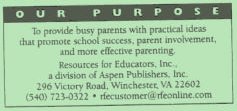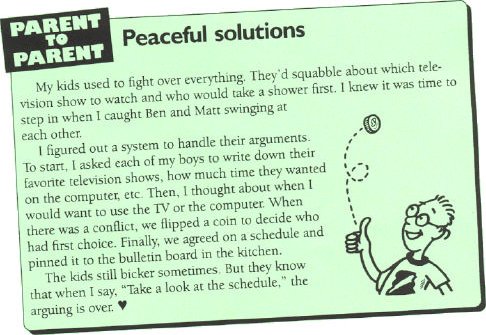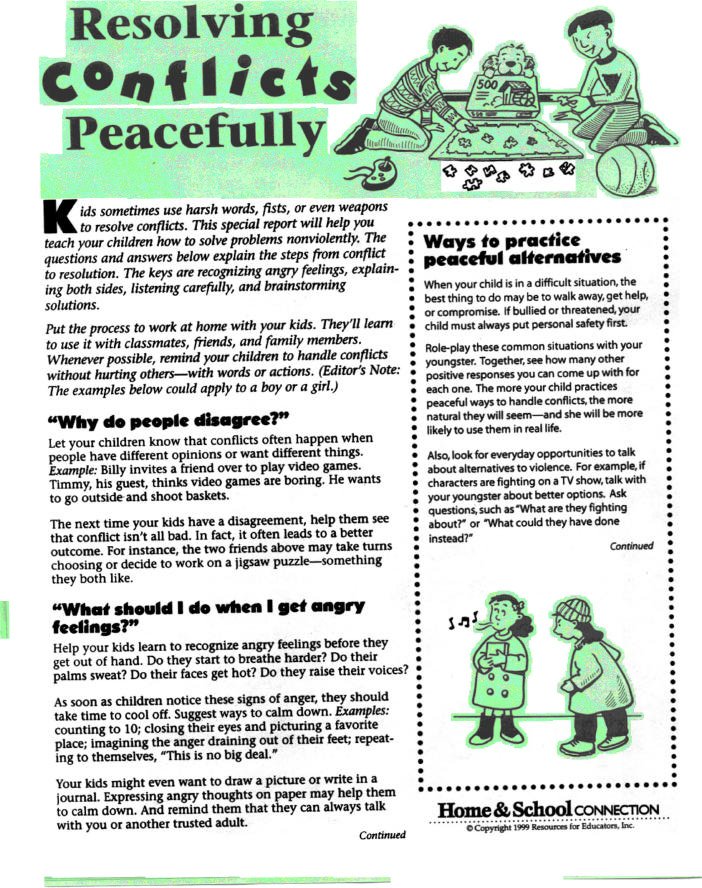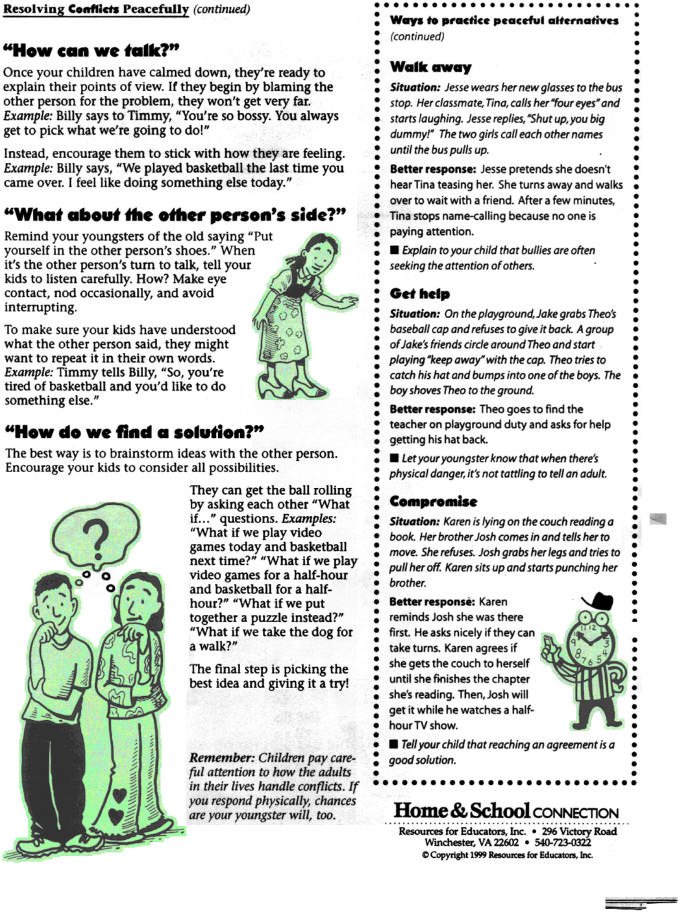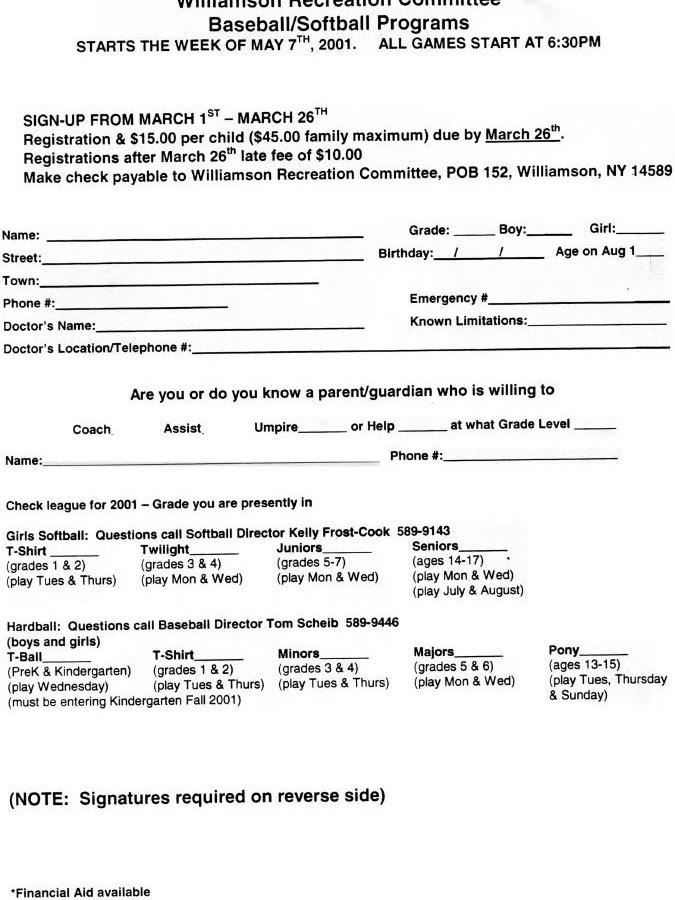Finding family time
Is it hard to get everyone together
for family activities? Try putting
them on the calendar. Choose an
evening each week
and write the
time alongside the scout meetings
and basketball games. That way,
you're sure to build in more family
time.
Internet safety:
Here are two important tips to keep
your children safe on the Internet.
Tell them to open emails only
from people they know. Also, they
should never give out information
about themselves on the Web.
Examples:
their school, age,
address, or friends' or family
members' names.
Math measures upl
Encourage your youngster to practice
measuring at home. Look for ways
he can use a tape measure, a ther
mometer, or scales.
Example:
"Why
don't you help me measure the
window? Will the curtains fit?"
Worth quoting
"when you come to a roadblock, take a detour. "
Mary Kay Ash
Q:
What do
you have to pay
when you go
to school?
A:
Attention!
With spring ri
ght around the
corner, it can be hard to keep
children focused on learning.
What can you do to make
school a top priority for your
kids? Keep these simple ideas
in mindthey're useful at any
time of the year.
Make attendance job
#
I.
Let your kids
know that unless they're sick, they must go
to school. Try to schedule routine dentist
and doctor appointments after school
hours. If possible, take family vacations
during school breaks.
Tip:
Give awards for
perfect attendance each month. Try a "Job
Well Done" certificate or a coupon good
for a night of bowling or a movie.
Show you care.
Want your children to
know that you're interested in their
learning? Talk about their school activi
ties and projects. Attend as many school
events as you can. If homework and after
school activities conflict, speak up:
= I
~
~
"I know you have baseball practice this
evening, but homework comes first. After
you finish, I'll take you to practice."
Keep it upbeat.
"Try to set a positive
example for your children, even when
your own day has been difficult. Instead of
saying, "I had a hard day at work. I'll
never get my project done,"
try, "Work was hard today, but I made
some progress on my project. " If you
show a positive attitude about your
work, your youngsters may feel better
about their own.
@
2001
Resources for Educafors. Inc" a division of
Aspen
Publishers. Inc.
~
For years people have been telling kids to "just say
no'
to drugs. How can children say no to other kinds of peer
pressure? Here are three situations your youngsters
might face and ways they could say no.
Handling uncomfortable situations:
"I have
nightmares after I watch scary movies. Can you please
change the channel?"
Skipping family responsibilities:
"I can't come over now because I have to do my chores. If
I don't, I won't be able to go to Tanya's birthday party on Saturday."
Using tobacco:
"I have a relative who smokes a lot. It's not very nice to be around the
smoke. No, thanks." .
~
~
"' ~
HS33670
March
200
J
.Page 2
Q:
I've
heard so much about
standardized tests, but
I
don't
really understand what they are. What
can
I
do to help my child do well on them
?
A:
There are two kinds of standardized tests.
Standardized
achievement
tests measure what
children have already learned about a subject
in school. Standardized
aptitude
tests measure
how well children are likely to do in the
future. Many states evaluate their schools and
teachers on how well students perform on
these tests
.
Keep in mind that your child's test scores
can vary from day to day. Your daughter's
scores can be affected by how well rested she
is, so make sure she has a good night's sleep
before the test. Whether she is anxious or calm
during testing also makes a difference.
Encourage her to listen carefully to the
directions and take her time.
If you have questions about how
standardized tests are used in your child's
school, arrange a time to talk
to the teacher. .
Guess what
I'm
doing!
Kids are
asked to follow
directions
all the time.
Here's a game
where they get
to give the directions!
All you need is a pencil, paper, and
some creative thinking.
Each person thinks of a common tasksuch
as making a sandwich or washing dishes and
writes down the instructions. Then, everyone
takes a turn reading their instructions while the
others try to figure out the action being
described.
Example:
1. Pick up a round object. 2. lift
your arm. 3. Bring your arm down in front of
you. 4. Let go of the object. (Answer: throwing
a ball.)
Your kids will exercise their thinking skills
both in writing their own directions and in
figuring out what other people are describing. .
Poetry
corner
Did you know that poetry can help
build your child's reading and vocabulary
skills? And because many poems are
short, they're easy to read when you
have a little time. Try
these ideas
.Read one line of a
poem, and then let your
child read a line. If the
poem rhymes, read all
but the last word of a
line and see if your
youngster can fill in the
missing word.
Ø
Read a poem together before
school. Or, copy a poem and put it
in your youngster's book bag or
lunchbox.
Here are a few books to
get your kids into the poetry
reading habit:
A Child's Garden of Verses,
by Robert Louis Stevenson
Where the Sidewalk Ends,
by
Shel Silverstein
ReadAloud Poems for
Young People,
edited by Glorya
Hale .
@
2001
Resources for Educators, Inc" a division of Aspen Publishers, Inc.
EARLY ARRIVALS
Due to the lack of personnel to
supervise, we ask parents to d
e
liver students to school
no earlier
than 8:30 a.m.
We also ask that
you instruct your child, when
dropped off before 8:40 a.m., to
sit quietly on the bench in the hall
near the Main office. Thank you.
DROP OFFS OR EARLY
PICKUPS AT BUS TIME
If you are coming to school to
drop off a student or to pick a
student up early from school, we
ask that you pull into the parking
areas. We ask that you
not
drive
into or park in the bus circle be
tween 8:30 – 9:00 a.m.
OR
2:30 –
3:15 p.m.
FRIDAY, MARCH 16, 2001
SUPERINTENDENT’S CONFERENCE DAY
No School For Students
This conference day will focus on the goals of the Elementary School
THURSDAY, MARCH 15 & WEDNESDAY, MARCH 21, 2001
Early Dismissal For Parent Conferences
12:10 p.m. Dismissal
DISTRICT VOCAL CONCERT
Don’t forget the District Vocal Concert on Tuesday, March 13 at the High School Auditorium
at 7:00 p.m. Come and enjoy the vocal talent of our Williamson students as they perform for
you in celebration of “Music in Our Schools” Month.
The 4th Grade Chorus is looking forward to singing some of their Spring tunes for you!
LEARNING FAIR 2001
Have you ever wondered about the power of science, the
magic of math, and the experience of personalized learning?
The Learning Fair 2001 provides Williamson’s K – 12 students
the opportunity to display a major learning experience that
combines content knowledge with process skills to produce a
product or demonstration of learning. On Saturday, March 10
from 1:004:00 p.m. the Learning Fair will be open to the com
munity at the Williamson High School.
Students can produce projects and demonstrations in the fol
lowing areas: interdisciplinary, math, science, social studies,
English language arts, foreign language, technology, home and
careers, the arts, and health. Along with student projects there
will be a wide variety of presentations including middle and
high school musical previews, storytellers, and a select choir
and jazz ensemble performance. Other demonstrations include
a Red Cross awareness session, a chemistry demo, Rocks by
the Wheatons, Star Lab, and a session with the High School
Psychology class. Please share in the spirit of learning by at
PARENT ROLE IN NEXT YEAR’S PLACEMENT
Similar to the approach used last year, parents will be
given the opportunity to share their preferences with
the school. The following dates and activities have
been scheduled:
Monday, March 26, 2001
Packet of information regarding classroom options
sent home with students. This form will allow par
ents/guardians the opportunity to express your pref
erence from a list of options.
Friday, April 13, 2001
Deadline for return of your placement form
If you have questions or concerns, please feel free to
contact Miss Ressler @ 5899668.
KINDERGARTEN REGISTRATION
It is important that the process of registering
and preparing new kindergarten students
(and parents) occur on Thursday, May 3.
We ask that all registrations occur on this
date. If you are not able to attend registra
tion on May 3, please call the office to make
other arrangements.
PreKindergarten Parent Registration Night
Thursday, May 3, 2001.
Registration
5:30 – 8:00 p.m.
Information Program 7:00 – 8:00 p.m.
An appointment for a PreKindergarten
Screening will be set up at the time of regis
tration for the week of May 21 – 25, 2001.
Further information will be mailed to par
ents of incoming kindergartners.
PLAYGROUND CLOTHING
REQUIREMENTS
With the continuing changing of the
weather throughout the month of March,
we ask that students continue to come to
school prepared for playground. This
includes: gloves, hats, snowpants (or an
extra pair of pants), coats, and boots. The
playgrounds do tend to get muddy during
the Spring months.
We appreciate your cooperation in this
matter.
ROLLERSKATING PARTY UPDATE
Laurie VanNostrand, the 3rd & 4th grade roller
skating party chairperson, would like to thank
those who have chaperoned skating parties. The
students really appreciate the time you give. Al
though we have been able to get by with the num
ber of chaperones we have had, we sure could use
more! Some of the skaters still need a little extra
help and skates always need to be tied. You don’t
need to skate to chaperone. We hope you will
come and help us at our next skating party on
March 7. There is a place to volunteer on the bot
tom of the rollerskating permission slip.
Thanks for your help!
There is also the opportunity to chaperone at the 1st &
2nd grade parties! Come and join in the fun!!
SPECIAL EDUCATION ANNUAL REVIEW REMINDER
The parents or guardians of elementary children who receive special education services should
have received a letter with the date and time of their Annual Review appointment. This letter
will be accompanied by a postcard for you to use to confirm your appointment. Parents/
guardians are strongly urged to attend as the child’s individual e
ducation program will be
developed for the 20012002 school year. The meeting dates are scheduled for:
Friday, March 2, 2001 Wednesday, May 2, 2001
Tuesday, March 6, 2001
Thursday, May 10, 2001
Friday, March 9, 2001 Thursday, May 17, 2001
Tuesday, April 24, 2001
Thursday, May 31, 2001
Wednesday, April 25, 2001
HOME AND SCHOOL . . . A CRITICAL RELATIONSHIP
Current educational research has underscored something many knew was true. When parents
are directly involved in their child’s education, the child performs at a higher level. Involve
ment can take many forms such as:
⇒
daily checking of work
⇒
daily conversations with student about school
⇒
volunteering at school
⇒
frequent communication with classroom teacher
⇒
maintenance of routine at home that supports the educational process
⇒
Regular bed time, regular time for homework, good eating and hygiene habits
Your Elementary School, as part of it’s Effective Schools Program, is focusing on strengthening
the home/school network. The
goldenrod rule
involves the use of goldenrod paper to signify
items that need to be returned to school.
We look forward to our continued working relationship with you. If you have concerns or com
ments, please feel free to call 5899668
ELEMENTARY SCHOOL
5899668
MIDDLE SCHOOL 5899665
HIGH SCHOOL 5899621
BUS GARAGE 5896901
BUSINESS/DISTRICT OFFICE 5899661
CSE
5898308
APPOINTMENTS
We recognize that it is not always
possible to make doctor, dental,
and other necessary appointments
after school or on nonschool days.
However, we encourage you to re
quest nonschool time whenever
possible for such appointments.
Back to top








